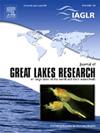The benthic nepheloid layer in the offshore waters of the Great Lakes and its post-dreissenid disappearance
IF 2.4
3区 环境科学与生态学
Q3 ENVIRONMENTAL SCIENCES
引用次数: 0
Abstract
Prior to the appearance of Dreissena, pronounced benthic nepheloid layers (BNL) near the bottom characterized by elevated levels of both turbidity and total phosphorus (TP), were a consistent and extensive feature of the offshore, stratified waters of all the Laurentian Great Lakes, except Lake Superior. In recent (2010–2019) years, the BNL has disappeared from all areas except for central Lake Erie, where only a small decrease in bottom turbidity has occurred. All stratified regions which exhibited a pre-Dreissena BNL, including central Lake Erie, experienced substantial post-Dreissena reductions in near-bottom TP, although the forms of phosphorus (particulate or soluble) responsible for these reductions have varied from lake to lake. Notably, the arrival of Dreissena at offshore sites was not accompanied by an increase in soluble phosphorus. Initiation of changes in the BNL almost invariably preceded appearance of Dreissena in the offshore, suggesting both that dreissenid impacts on the reductions in the BNL were largely remote, and by extension that the source of the BNL was also at least in part remote. Previous researchers’ estimates of the importance of the benthic pool of phosphorus to offshore water column concentration suggest that the post-invasion reductions in bottom phosphorus during the stratified season could be contributing to the offshore oligotrophication of the lakes.
五大湖近海水域的底栖藻类层及其在裂头藻类消失后的情况
在出现 Dreissena 之前,除苏必利尔湖外,所有劳伦伦五大湖近海分层水域都有明显的底栖软骨层(BNL),其特征是浊度和总磷(TP)水平均升高。近年来(2010-2019 年),BNL 已从所有地区消失,只有伊利湖中部地区的湖底浑浊度略有下降。包括伊利湖中部在内的所有在 Dreissena 之前出现 BNL 的分层区域,在 Dreissena 之后都经历了近底总磷酸盐的大幅减少,尽管造成这些减少的磷的形式(颗粒或可溶)因湖而异。值得注意的是,离岸地点出现 Dreissena 的同时,可溶性磷并没有增加。BNL的变化几乎总是先于离岸磷虾的出现,这表明磷虾对BNL减少的影响在很大程度上是遥远的,进而表明BNL的来源至少在一定程度上也是遥远的。以前的研究人员估计底栖磷库对近海水体浓度的重要性,这表明入侵后分层季节底层磷的减少可能是造成湖泊近海少营养化的原因之一。
本文章由计算机程序翻译,如有差异,请以英文原文为准。
求助全文
约1分钟内获得全文
求助全文
来源期刊

Journal of Great Lakes Research
生物-海洋与淡水生物学
CiteScore
5.10
自引率
13.60%
发文量
178
审稿时长
6 months
期刊介绍:
Published six times per year, the Journal of Great Lakes Research is multidisciplinary in its coverage, publishing manuscripts on a wide range of theoretical and applied topics in the natural science fields of biology, chemistry, physics, geology, as well as social sciences of the large lakes of the world and their watersheds. Large lakes generally are considered as those lakes which have a mean surface area of >500 km2 (see Herdendorf, C.E. 1982. Large lakes of the world. J. Great Lakes Res. 8:379-412, for examples), although smaller lakes may be considered, especially if they are very deep. We also welcome contributions on saline lakes and research on estuarine waters where the results have application to large lakes.
 求助内容:
求助内容: 应助结果提醒方式:
应助结果提醒方式:


